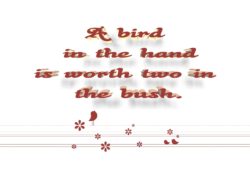
Yes, the title may sound like an end-of-the-year post (maybe next week), but it isn’t . . .
- All’s well that ends well
- A method to his madness
- The long and short of it
- It’s Greek to me
- Heart of gold
- Kill with kindness
- Wild goose chase
- A foregone conclusion
- All that glitters is not gold
- A rose by any other name would smell as sweet
- In one fell swoop
- I have not slept a wink
- The be all and the end all
- Make an ass of yourself
These are all idioms, and every one of them (and there are tons more) were first said by Shakespeare in his plays. An idiom is a group of words that means something other than what the words literally say. No one is really chasing a goose (most likely) in a wild goose chase. No one really has a heart made out of gold or turns into an ass (the animal kind).
Do you know the meanings of those idioms? I taught 7th grade, and I used to have the students read a shortened version of Julius Caesar – shortened, but the original Shakespearean language was used. That play contains the idiom It’s Greek to me. So I would have a worksheet with many other Shakespeare idioms and have them work in pairs to figure out the meanings. I was surprised when they claimed they had not heard of most of these idioms. But then the students were 12 or 13 years old, and I guess these sayings just aren’t as popular as they once were.
Here are the meanings of the above idioms :
- All’s well that ends well – If it ends well, it was all worth it.
- A method to his madness – What he or she is doing might look crazy, but there is actually a plan behind it.
- The long and short of it – The whole story.
- It’s Greek to me – I do not understand what you are saying; you may as well be speaking Greek.
- Heart of gold – A really kind, generous heart.
- Kill with kindness – To be so kind as to be annoying.
- Wild goose chase – Chasing after something or looking for something that will be hard to find.
- A foregone conclusion – An ending to something that can be predicted at the beginning.
- All that glitters is not gold – Just because something looks good doesn’t mean it IS good.
- A rose by any other name would smell as sweet – What something or someone is named doesn’t affect what it is like.
- In one fell swoop – All at once.
- I have not slept a wink – I haven’t slept at all.
- The be all and the end all – The best possible. (She thought her party was the be all and end all.)
- Make an ass of yourself – Make yourself look foolish.
There was one Shakespeare idiom that they students really had trouble with. Can you guess what it was? It isn’t one of the ones above.
No, the one they couldn’t figure out is “salad days.” Salad days means the good old days, apparently meaning when we were green and innocent.
But not all idioms are from Shakespeare of course. Our good friends at ProofreadingServices.com have an infographic with many common idioms and their meanings. Just click here to see it.
Have a Save and Happy New Year (and that’s no idiom)
Next week: A New Year’s Post



Decades ago, when I taught fifth grade, a parent told me after she visited my classroom that “there must be a method to my madness,” because I had learning centers, used student contracts, and allowed the students to work in groups, etc.
I have laughed about that day through the years.
Thanks for reminding me.
What madness!!! Good teaching! Thanks for sharing!
That was certainly the be all to end all. Thanks!
😉 Thank you!
Thanks for the “salad days” definition. I thought it was diet time!
It is almost that too!